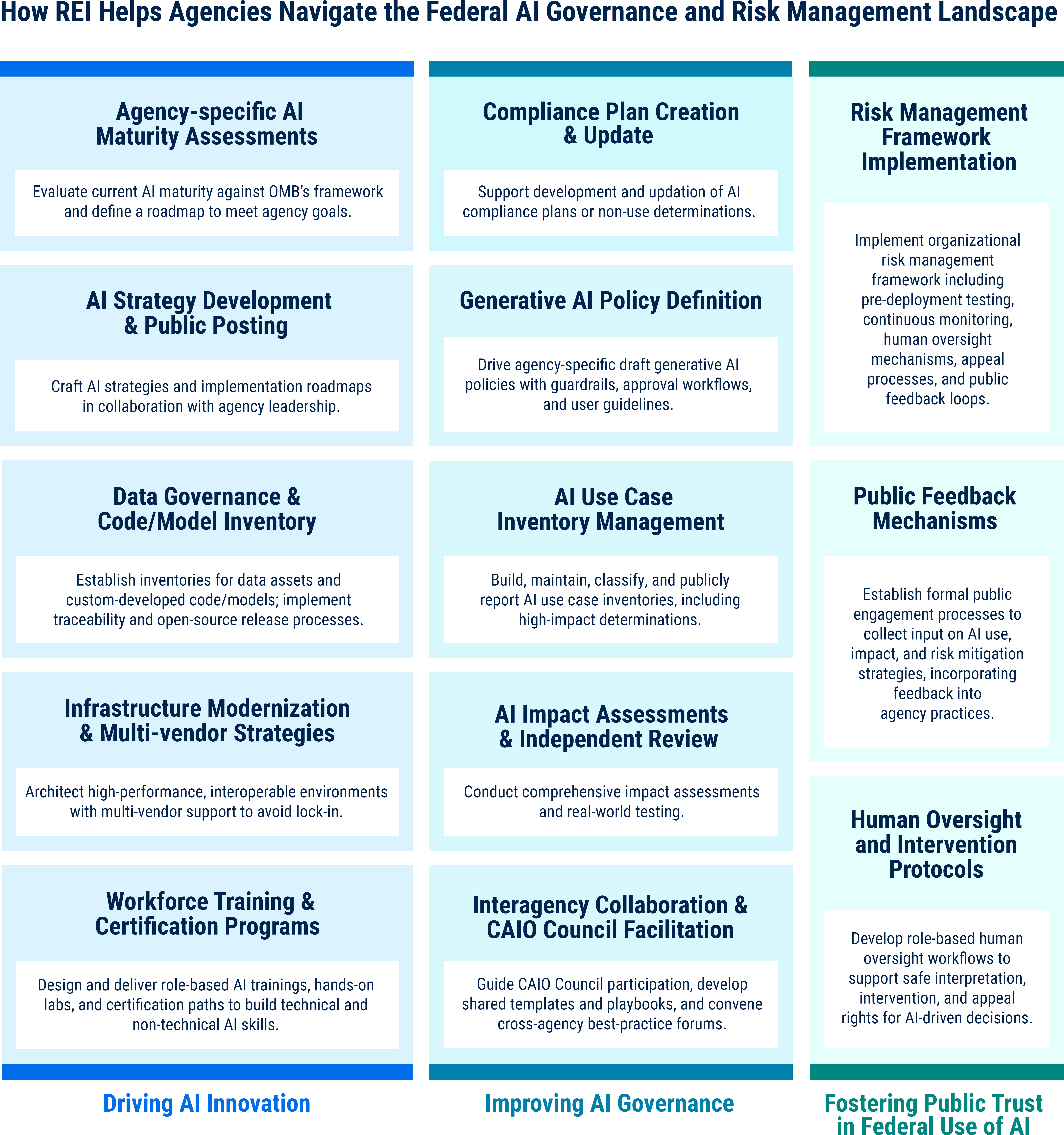By Anand Trivedi, REI Systems’ AI Offering Lead
On April 3, 2025, the Office of Management and Budget (OMB) released two pivotal memoranda—M-25-21 and M-25-22—establishing a new direction for how federal agencies govern, adopt, and procure artificial intelligence (AI). These memos establish three core priorities for agencies: driving AI innovation while promoting American technologies, improving AI governance, and fostering public trust in federal use of AI.
As a mission-driven technology partner, REI Systems is closely aligned with these priorities and well-positioned to help agencies implement the guidance effectively.
Key Requirements for Federal Agencies
1. Driving AI Innovation
Agencies must remove barriers to innovation and maximize taxpayer value:
- AI Strategy Development: Within 180 days, agencies must publish an AI Strategy—using OMB’s template—to identify current and planned use cases, assess AI maturity across infrastructure, data, workforce, and governance, and set measurable goals.
- Data & Asset Reuse: Proactively share and reuse custom‑developed code, models, and data assets government‑wide, releasing open source when possible and inventorying AI code/model weights under the OPEN Government Data Act.
- “Buy American” AI: Prioritize U.S.‑developed AI products and services in procurements, negotiate data‑rights and vendor‑lock‑in protections, and promote interoperable, multi‑vendor strategies.
- Infrastructure Modernization: Invest in high‑performance computing, cloud‑native platforms, and agile DevSecOps pipelines to support the entire AI lifecycle.
- AI‑Ready Workforce: Leverage government‑wide AI trainings, certify practitioners, recruit experienced talent, and upskill non‑technical staff to achieve enterprise‑wide AI literacy.
2. Improving AI Governance
Strong governance accelerates responsible adoption:
- Chief AI Officer (CAIO): Within 60 days, designate or hire a CAIO (SES/GS‑14+), empower them to lead AI strategy, maintain the AI Use Case Inventory, and represent the agency on interagency councils.
- Agency AI Governance Board: Convene senior stakeholders (IT, data, legal, privacy, civil rights, budget, program offices) under a Deputy Secretary–level chair to guide AI policies and oversight.
- Compliance Plan: Submit and publicly post, within 180 days, a plan to achieve alignment with M‑25‑21 (or a non‑use determination), updating it biennially through 2036.
- Policy Updates: Revise internal IT, data, cybersecurity, and privacy policies within 270 days; develop a Generative AI policy to govern acceptable use and oversight.
- AI Use Case Inventory: Maintain and publicly post an up‑to‑date inventory of all AI use cases at least annually, classify “high‑impact” cases, and track determinations centrally.
3. Fostering Public Trust in Federal Use of AI
Trustworthy AI underpins every consequential decision:
- High‑Impact AI Determinations: Identify AI applications whose outputs serve as the principal basis for actions affecting civil rights, health, safety, critical services, or strategic resources (per Section 6 categories).
- Minimum Risk Management Practices: Within 365 days, implement required practices for high‑impact AI, including:
-
- Pre‑Deployment Testing with real‑world evaluation and vendor‑agnostic methods
-
- AI Impact Assessments detailing intended benefits, data quality, privacy/civil‑rights impact, independent review, and risk acceptance
-
- Ongoing Monitoring for performance, robustness, and fairness
-
- Human Oversight & Training to interpret outputs, intervene safely, and offer appeal mechanisms
-
- Public Feedback Channels for end‑user input on AI design and deployment
- Waiver Tracking & Reporting: Centrally track any waivers from minimum practices, certify them annually, and publicly report determinations and justifications.
REI is Taking a Mindful Approach to AI Adoption
With more than 20 years of experience supporting 25+ federal agencies, REI brings deep knowledge of modernization, digital transformation, and AI enablement. Our Mindful Modernization™ approach helps agencies turn policy into practice—delivering measurable outcomes through the thoughtful integration of people, processes, and technology.
We support clients from governance and planning to implementation and oversight, helping them adopt AI effectively and responsibly.
Our Commitment to Safe and Trustworthy AI Practices at REI
REI has integrated AI transformation and governance into our delivery framework to ensure every engagement reflects best practices in cutting-edge AI tools’ adoption, security, compliance, and responsible innovation.
Driving AI Innovation
- AI forms a core element of REI’s Digital Transformation approach, making it the de facto part of our solutioning process.
- AI is not just being leveraged as a core component of our solutions but also forms a foundation of how we build them. AI-driven app modernization accelerators, code generation tools, and automated test case generation tools are being extensively used in our delivery practices.
- We grow our AI talent through hands-on training, certifications, and ongoing learning—with a strong emphasis on risk management.
Improving AI Governance
- We’ve embedded an AI governance pillar into our Delivery Excellence Framework to guide our teams on security, compliance, transparency, and accountability.
- Consequently, robust risk management practices grounded in M-25-21, M-25-22, the NIST AI RMF, and other global AI governance frameworks, are now a part of our business-as-usual approach.
- Our internal AI governance effort is constantly updated in collaboration with academia, researchers, and industry leaders to stay at the forefront of AI risk management.
Fostering Public Trust in Federal Use of AI
- We apply strict cybersecurity and governance protocols to safeguard sensitive federal data across our AI solutions.
- Our AI development and deployment process leverages cutting-edge industry tools for model evaluation, continuous model drift monitoring, improved explainability, and human-in-the-loop decision support to ensure transparency and accountability.
As federal agencies respond to the updated AI policies, REI Systems stands ready to help them implement compliant, secure, and effective solutions.
We go beyond meeting mandates—we help agencies lead with confidence and purpose.





